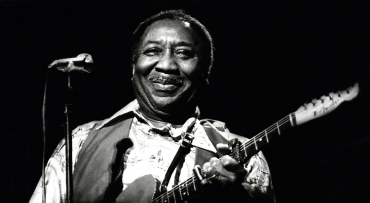Only true fans will know the late McKinley Morganfield by his birth name, but the entire world was touched by the American blues musician, Muddy Waters. Best known for HoochieCoochie Man, Mannish Boy, and Feel Like Going Home, Muddy Waters totally transformed the future of blues by introducing the electric guitar to the genre. With a trusty Gibson guitar plugged into an amp, he electrified traditional Mississippi Delta and catapulted it into the mainstream.
To Morganfield, Muddy Waters was no stage name. Earning the nickname when he was just a young boy, friends and family called him Muddy due to his penchant for playing in the mud. By the time he hit his teens, however, he had risen from the muck to pick up a guitar and play the blues. It was in 1941 that he was discovered by musical scout, Alan Lomax, who was searching the Delta region for musicians who he could record for the folk-song archives of the Library of Congress. Once he hit Mississippi, he discovered the future Gibson aficionado, Waters.
Waters’ particular jagged bottleneck guitar playing style intrigued Lomax, and he was taken by the young guitarists immediately. Lomax persuaded Waters to move to Chicago, where early blues pioneers John Lee Hooker, Johnny Shines, and T-Bone Walker could be found. It would be there that Waters would switch to the electric guitar because (as he often said in later interviews), “couldn’t nobody hear you with an acoustic”.
The switch in instrument was the last key element in making Waters a star. This and his traditional, earthy vocal style gave birth to the modern blues Chicago is now synonymous with. Throughout his journey,with hundreds of guitars to choose from, Muddy always relied on Gibson guitars to create his signature style. Starting with the L-5, he moved onto the ’52 Les Paul Gold Top, known for its rhythm pickups.
As the 50s rolled into the 60s, his genre lost some popularity with younger black listeners who turned their ears towards the soul and pop sounds originating from Motown. Still, there was something universal about his music that garnered him a new audience of young, white middle class fans born out of the folk music revival. His old venues of taverns and smoked-filled back halls were soon replaced by festival stages, university auditoriums, and jazz clubs.
The last years of his life were highlighted by many significant moments. He released three of his most commercially successful discs: Hard Again, I’m Ready,and King Bee. He played numerous gigs with such younger, well-known performers as The Rolling Stones and Eric Clapton who named him as a mentor.
On April 30, 1983 Muddy Waters, now sitting at number 17 in Rolling Stone magazine’s list of the “100 Greatest Artists of All Time”, died at this home in Westmont, Illinois at the age of 68. Four years later, he was inducted into the Rock and Roll Hall of Fame for his contributions to the development of blues and his influence on musicians who followed him.

